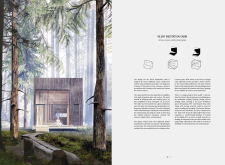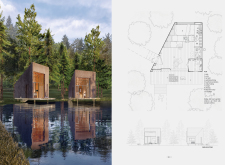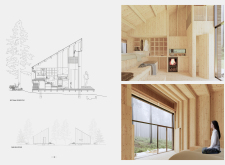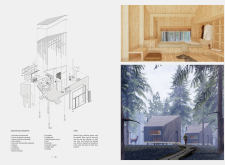5 key facts about this project
Situated in the tranquil landscapes of Latvia, the Silent Meditation Cabin is designed for those seeking peace and a deep connection to nature. Inspired by traditional Latvian architecture, the cabin's unique right trapezium shape enhances the sounds of chirping birds and rustling leaves, creating an immersive environment. This thoughtful design allows visitors to engage more deeply with their thoughts and surroundings, enriching their experience of meditation and introspection.
Design Concept and Spatial Organization
The cabin’s form is more than just a sheltered space; it is a device for perception. By amplifying the subtle sounds of the environment, it invites calm into daily life and fosters a stronger bond with the natural world.
Inside, the spaces are clearly organized from public to private areas. Upon entering, visitors are in the main meditation area, which features large windows that provide beautiful views of the landscape. The interior is designed for flexibility, allowing for activities like meditation, reading, and tea-making. This functional layout makes the space welcoming and highly adaptable.
Materiality
The cabin was constructed using prefabricated modules, which were efficiently assembled on-site. The structure is supported by four concrete piers for stability. The exterior features a pine frame that remains exposed on the inside, creating a direct connection to the natural setting. The interior uses light-colored plywood for a warm atmosphere, while natural pine-wood panels provide insulation to keep the space comfortable throughout the year.
Functional Elements
The compact layout effectively organizes all necessary facilities—a bathroom, kitchen, study area, and wardrobe—into a “thick wall” along one edge of the cabin. A wood-burning fireplace and a small stove for making tea enhance the usability of the space. Additional features, such as sliding doors and operable windows with mosquito screens, further strengthen the relationship between the cabin and its natural surroundings. A rainwater collection system gathers water from the roof and stores it beneath the sleeping area.






















































